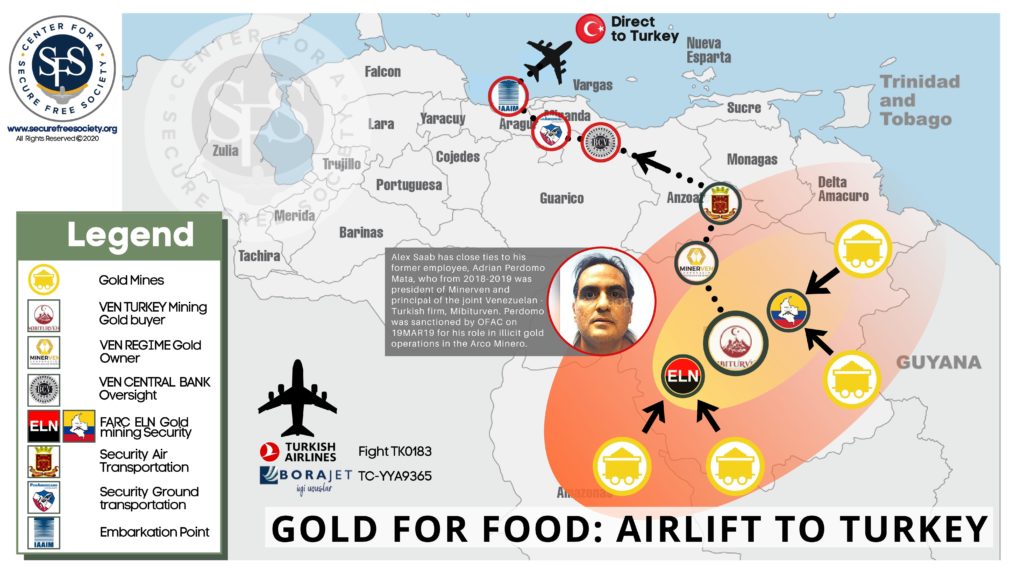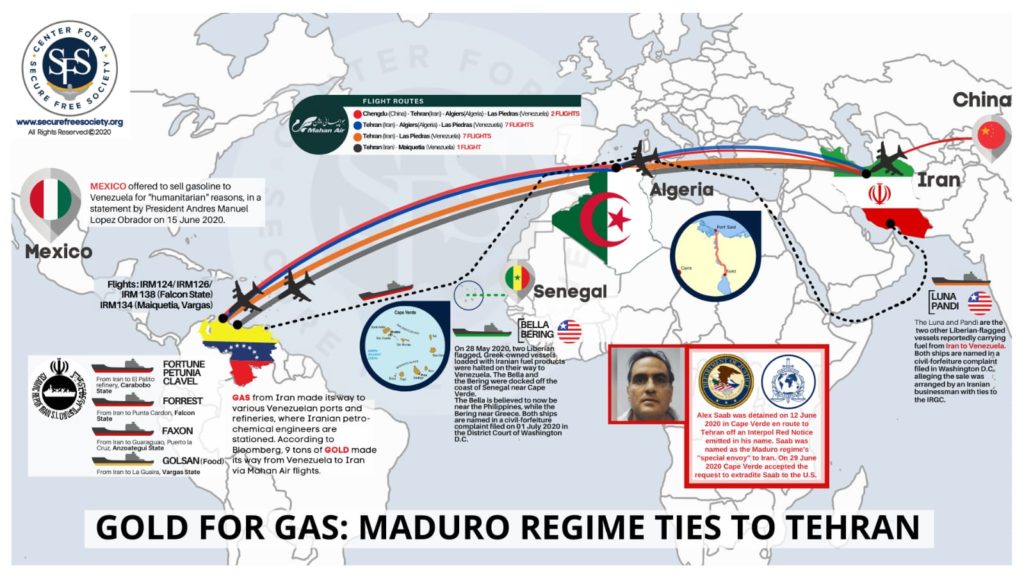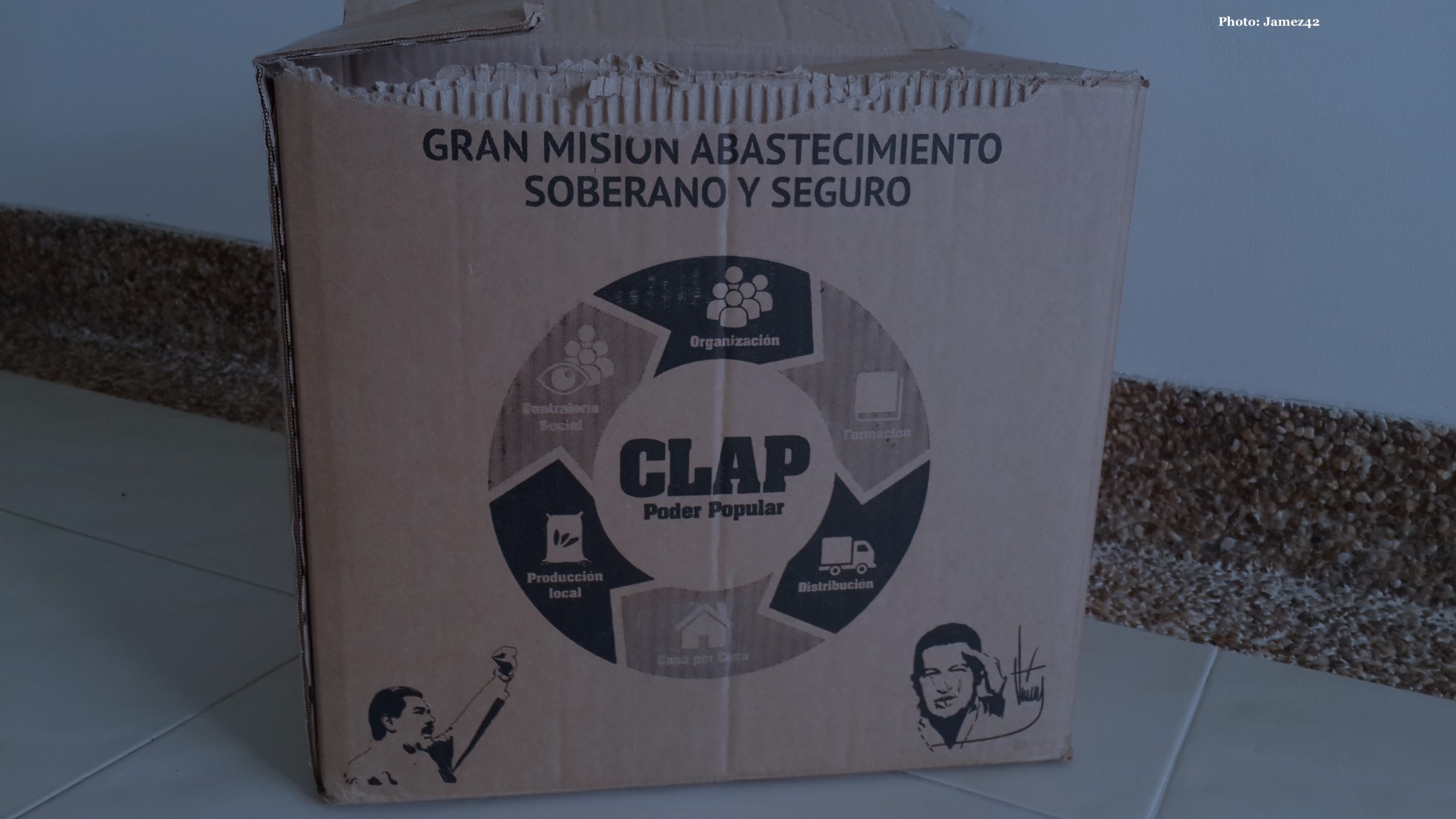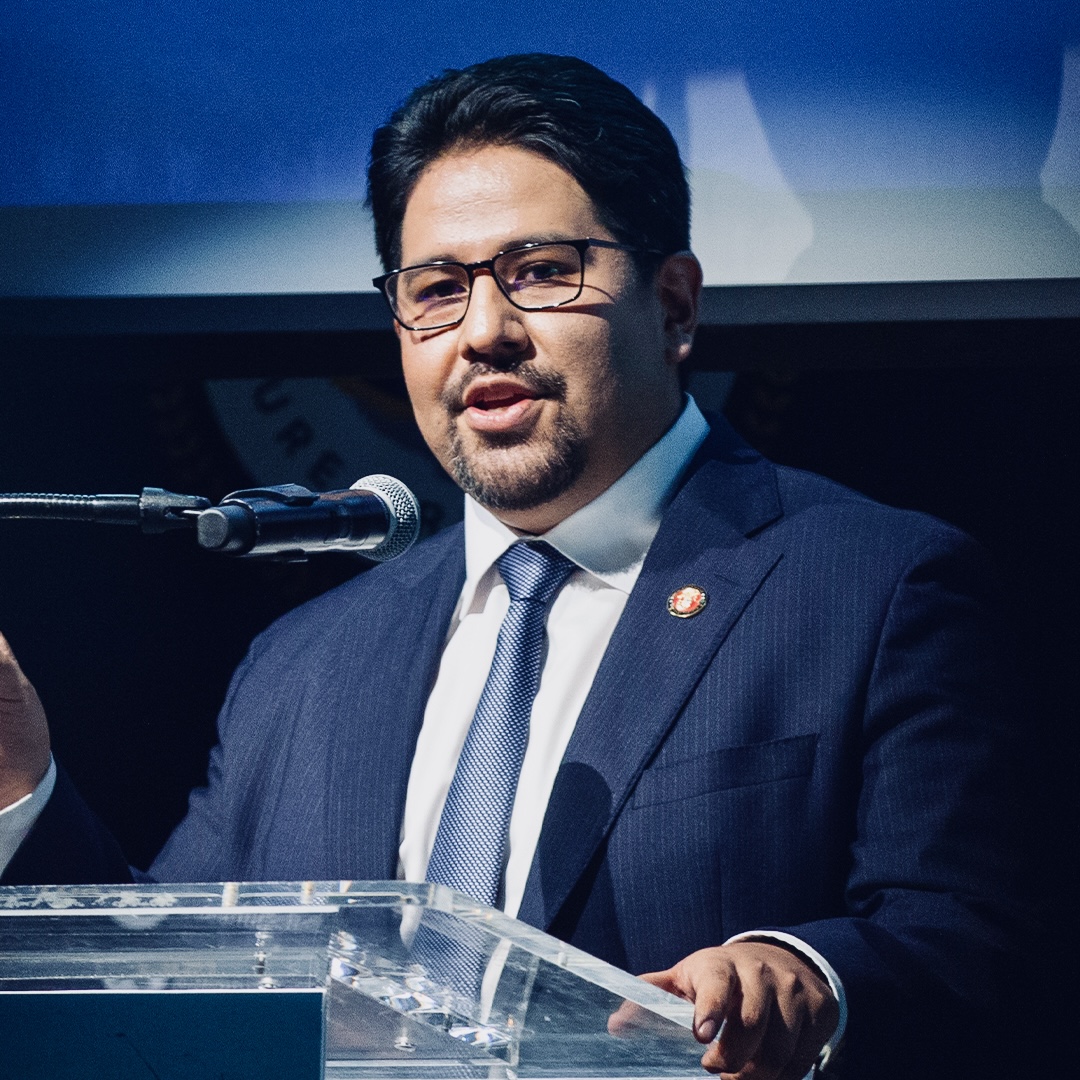EXPERT
Issues
Locations
DOWNLOAD
On June 12, Alex Nain Saab Morán, a Colombian businessman of Lebanese descent, was arrested at Amílcar Cabral International airport in Cape Verde. This was a huge blow to the Maduro regime’s illicit networks, as Saab is a key facilitator, involved in alleged corrupt dealings and money laundering in Venezuela since 2004.
His arrest was made after years of investigations on behalf of the U.S. and Colombia to uncover a myriad of shell companies that Saab; his business partner, Alvaro Pulido Vargas; and family members set up. Considered a fugitive in Colombia, in October 2018, Colombian prosecutors arrested and charged two of Saab’s associates with money-laundering through an import-export business in Baranquilla, then officially charged Saab with money-laundering the following year. In July 2019, the U.S. Justice Department indicted Alex Saab, as well as Pulido Vargas, on seven counts of money laundering, concurrently as Treasury’s OFAC sanctioned Saab and Pulido Vargas for looting hundreds of millions of dollars from the Venezuelan people.
Detained in Cape Verde, Alex Saab is in the process of possibly being extradited to the United States. The Maduro regime and Saab’s lawyer, unsuccessfully, attempted to free Saab, arguing for “habeas corpus” and presenting his “diplomatic” credentials. Saab’s importance to the Maduro regime goes beyond his trade-based money-laundering mechanisms. He is a financial and logistical architect or “super facilitator” for Venezuela’s strategic ties to the Middle East.
Saab as a Super Facilitator
In the national security lexicon, Alex Saab is a “super facilitator,” managing illicit networks in various countries across continents on behalf of the Maduro regime. Blending these criminal networks with legitimate efforts, such as humanitarian assistance, is his specialty. Saab’s networks were illuminated in 2018 when the Maduro regime began a complex gold-for-food scheme with Turkey’s President Recep Tayyip Erdoğan. The scheme was built off Saab’s prior existing corruption network that tapped into Venezuela’s gold-rich Arco Minero and Venezuela’s military-run food distribution system, CLAP.
Saab’s involvement in the CLAP program started in 2016, when he and Pulido Vargas worked out a way to profit from the corrupt regime infrastructure. By using a company to acquire the food from a foreign distributor and assemble it in a foreign country, Saab and Pulido Vargas were able to reap sustainable profits importing a fraction of the food necessary for the program to function. Saab and Pulido Vargas used various shell companies in the scheme, the most infamous, Group Grand Limited (GGL Hong Kong) and Group Grand Limited, S.A. de C.V. (GGL Mexico), both controlled by Saab, Pullido Vargas, and/or family members and close associates.
In 2018, as the economic and humanitarian crisis in Venezuela raged on, foreign exchange became scarce and the Maduro regime began using gold to pay out some of its contracts, including the CLAP contract. Thus involving Venezuela’s illicit gold trade in the food distribution scheme, as well as Turkey. Once extracted from Venezuela’s mines, gold was sent to Turkey to be refined– instead of the country’s previous refiner, Switzerland– strengthening the Maduro regime’s burgeoning relationship with Turkey’s Erdoğan.
Meanwhile, Nicolás Maduro appointed regime strongman Tareck El Aissami as the Minister of Industries and National Production in June 2018 essentially overseeing the mining operations with Turkey. Tareck’s key facilitator was Alex Saab, who, once more, profited off the regime’s corruption, as he secured gold from miners at an inflated market rate and had close connections to many of the officials leading the state-run mining conglomerate in Venezuela.

Explaining the Gold-for-Food scheme with Turkey
- Miners extract gold from the Arco Minero in eastern Venezuela under the supervision of the Colombian guerrilla groups ELN and FARC. The gold is then purchased by Venezuela’s state-owned gold company, Minerven, through a joint gold venture with Turkey called Mibiturven S.A.
- The gold is then turned over to CVG MINERVEN, the state-owned Venezuelan mining conglomerate that processes the gold and packages it for transport to Caracas.
- Once processed, the gold is transported by the Venezuelan National Guard to the Central Bank of Venezuela (BCV), who prepares it for international shipment. The gold is moved from BCV to Maiquetia International Airport using the private security firm Transporte Panamericano and loaded onto one of several, private airliners, or a commercial Turkish Airlines flight, with weekly service to Istanbul via Havana.
- The gold is received in Turkey, to be sold on the European market, and bought by companies located in Turkey and the UAE. In 2018, 73 tons of gold were sold to three companies: Capital Noor (United Arab Emirates), Goetz Gold LLC (United Arab Emirates), and Sardes Kiymetlí Madenler (Turkey).
- At this point, the trail is cloudy. Some sourcing shows in 2018, Venezuela imported 33,306 tons of food from Turkey. Other sourcing shows GGL Hong Kong making almost $200 million in payments from off-shore accounts in the Caribbean to Mexican food distributors.
- These CLAP food shipments are delivered to La Guaira on the Colombia-Venezuela border on behalf of the Venezuelan development fund FONDEN, who is listed as GGL’s ordering agent. A lack of transactions originating from BCV or FONDEN, however, suggests that the source of the money paid to Mexican distributors originates from gold mining operations in the Arco Minero.
Through the gold-for-food scheme, Alex Saab established a humanitarian corridor to Venezuela based out of a trade-based money laundering network to steal millions from starving Venezuelans through no-bid contracts for the CLAP program. Saab’s sophisticated setup of shell companies operating under the guise of humanitarian help exposed Maduro regime’s state support that was necessary to pull off the elaborate scheme.
As one of the regime’s most important super facilitators, Nicolás Maduro and Tareck El Aissami tapped Alex Saab once again in 2020 to set up a new scheme, this time with the Islamic Republic of Iran. Facing rampant shortages of gasoline, Maduro appointed Tareck as the new Minister of Petroleum in April 2020 and sent Saab to Tehran as a special envoy to reportedly work out a new gold-for-gas scheme that could mirror the previous scheme for food.
Bloomberg subsequently logged a month’s worth of Mahan Air roundtrip flights to and from Venezuela allegedly carrying nine tons of gold. This was followed by five Iranian oil tankers that docked in various Venezuelan ports in May, carrying around a million and a half barrels of gasoline. These fuel shipments from Iran were met with a tremendous amount of fanfare by the Maduro regime and sympathizers in Venezuela, broadcasting the ordeal in its state-run television networks and raising the Islamic Republic’s flag throughout regime strongholds in Caracas.
Explaining a potential Gold-for-Gas scheme with Iran
- Gold is presumably mined from the Arco Minero much like it was in the gold-for-food scheme with Turkey. Aside from the ELN and FARC, however, some reports suggest Hezbollah is also on-the-ground in this mineral dense region in eastern Venezuela.
- Alex Saab’s local corruption network that took the gold from ore to embarkation in the previous scheme, is likely to be used again in a gold-for-gas scheme. Iran, however, has a slew of front companies in the Bolivar State that could help evade sanctions on Venezuela’s mining conglomerate, CVG MINERVEN.
- The Mahan Air flights or other recently acquired private airlines can be used to send gold and other forms of payment to Tehran. It should be noted that the Venezuelan cryptocurrency, Petro Gold, could also be used as an alternative payment.
- Gas makes its way to various Venezuelan ports and oil refineries, including the Puerto La Cruz Refinery in Anzoategui, El Palito Refinery in Puerto Cabello, and Amuay Refinery at the Paraguana Refinery Complex, where Iranian petro-chemical engineers are stationed.
- Mexico has recently offered to sell gasoline to Venezuela for “humanitarian” reasons, which could capitalize on the same humanitarian corridor established by Alex Saab and his front company, Group Grand Limited, in the Maduro regime’s gold-for-food scheme.

Iran has decades of experience in setting up similar sanctions-busting schemes. In July 2018, Tehran announced the PayMon, a gold-backed cryptocurrency and pitched it as part of the EU-based cryptocurrency international payment gateway, INSTEX. Considered irrelevant for Iran-EU trade at first, on March 31, the first INSTEX transaction was made for an import of COVID-19 medical goods from Europe to Iran. Moreover, Turkey has been helping Iran evade U.S. sanctions since 2012, through a multibillion dollar gas-for-gold sanctions evasion scheme that involved the Turkish state-owned, Halkbank. Now, Turkey seems to be helping Maduro’s embattled regime evade U.S. sanctions while Iran and Venezuela set up a potential gold-for-gas scheme.
At the heart of the Maduro regime schemes with Iran and Turkey is Alex Saab, whose extradition process has been approved and is pending a decision by the Cape Verde authorities. Not since the detention of General Hugo “El Pollo” Carvajal in Aruba in 2014, has so much attention been paid in Venezuela to one potential extradition case. Unlike the Carvajal case, however, the U.S. government has seemingly prioritized the Saab case and authorities are working overtime to ensure that Alex Saab appears before the U.S. Southern District of Florida in Miami. In the meantime, the Saab case is instructive to help understand the Maduro regime’s transregional threat networks running from Latin America to the Middle East.


 Joseph M. Humire
Joseph M. Humire